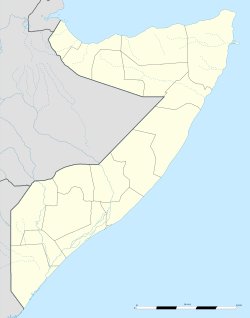Bajuni Islands
Somali archipelago in the Indian Ocean From Wikipedia, the free encyclopedia
The Bajuni Islands (Somali: Jasiiradaha Jubbada Hoose; Italian: Isole Giuba, also known as the Bajun Islands[1] or Baajun Islands) are an archipelago in southern Somalia.[2] They are situated in the Somali sea off the southern coast of Jubaland, from Kismayo to Ras Kamboni.
| Geography | |
|---|---|
| Total islands | 9 |
| Major islands | Chandra, Chovaye, Chula, Koyama, Darakasi, Ngumi |
| Administration | |
Somalia | |
| Demographics | |
| Ethnic groups | Bajuni people |
Geography
Administratively, the islands are within the Lower Juba region of Somalia.
There are six main islands:
- Chandra (2.95 km²),
- Chovaye (also spelled Tovai;[1] 0.8720°S 42.1593°E) (5.46 km²),
- Chula (also spelled Tula;[1] 1.0052°S 42.0364°E) (1.99 km²),
- Koyama (6.38 km²),
- Darakasi (1.99 km²) and
- Ngumi (2.56 km²).
Chula, where the village of Ndowa is situated, is the only island with a significant population
In addition, there are several smaller islands, including Kandha Iwu, Fuma, and Ilisi. The island of Kismayo was attached to the coast in 1961 during the construction of Kismayo Port.
History
The islands were part of the ancient Somali empires [dubious – discuss], merchants, and fishermen who used it as an offshoot to trade with other civilizations in the spice world.[citation needed] The Somali Ajuran Dynasty utilized it for centuries as part of their kingdom. After the decline of several Somali empires later, the islands became less inhabited until the colonial invasion by the British East Africa prior to World War I.[1] The Bajuni Islands formed a constituent part of British Jubaland. In 1924, mainland Jubaland was ceded to Italy, while the Bajuni Islands were transferred two years later.[1][3]
According to C. Wightwick Haywood, a British official in Kismayo who visited the islands in 1913, the only inhabited islands in the chain were Chovaye and Chula. Maize, millet, sweet potatoes and coconuts were grown on the islands, and dhows were used for transportation. While there, Haywood saw ruins of what he described as a "fair-sized town" on Chovaye. He mentioned that similar stone scrollwork could also be seen on houses in the Lamu Islands. Haywood thought some of the residents to be of Arab or Persian descent.[1]
Demographics
The islands are today mainly inhabited by the eponymous Bajuni people.[4]
See also
Notes
Wikiwand - on
Seamless Wikipedia browsing. On steroids.
